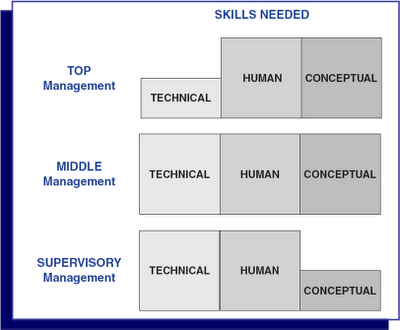 The skills approach is the idea that a leader possesses certain abilities that enables he or she to serve as a leader (Pennsylvania State University, 2013). Robert Katz contributed the Three Skills Model: Technical, Human, and Conceptual (Pennsylvania State University, 2013). Technical skills are the knowledge and proficiency one has in a certain area (Northouse, 2012). Human skill is the ability to work with and relate to people (Northouse, 2012). “Conceptual skills are the ability to work with ideas and concepts” (Northouse, 2012).
The skills approach is the idea that a leader possesses certain abilities that enables he or she to serve as a leader (Pennsylvania State University, 2013). Robert Katz contributed the Three Skills Model: Technical, Human, and Conceptual (Pennsylvania State University, 2013). Technical skills are the knowledge and proficiency one has in a certain area (Northouse, 2012). Human skill is the ability to work with and relate to people (Northouse, 2012). “Conceptual skills are the ability to work with ideas and concepts” (Northouse, 2012).
Depending on what level of management one is in, different skills are needed more than others. A supervisor will need Human and Technical skills (Northouse, 2012). Middle manangement requires all of the skills, Human, Technical, and Conceptual (Northouse, 2012). Top level management needs Human and Conceptual skills (Northouse, 2012). “It is important for leaders to have all three skills; depending on where they are in the management structure, however, some skills are more important than others” (Northouse, 2012).
The above paragraph rings true for where I work. There is a Supervisor, Director, and CEO. My supervisor interacts with employees daily making sure our system is running smoothly and fixing any problems that may occur (technical skill). She also will talk to patients directly especially if a problem comes about and will do her best to resolve it (human skill). She is not asked to do much beyond that. Our director oversees the operations of the entire department. She will make sure that the systems are up to date and working properly (technical skill). She will also speak with patients if a problem is escalated to her level as well as manage employees from 10 locations (human skill). Our CEO is required to go out and meet people to raise money for the hospital (human skill). He must also interact with the member of the board to make sure they are pleased with how things are going (human skill). He also needs to make sure that the hospital has obtainable goals and a strategy in place to reach those goals. This requires a great deal of conceptual skill.
References
Pennsylvania State University. (2013). Skills Approach. [Online lecture]. Retrieved from http://cms.psu.edu
Northouse, P. (2012). Leadership: Theory and practice. (6 ed.). Thousand Oaks, California: Sage Publishing.

Christian
I like how you used the example to relate to the 3 Skills Approach. I also work at a job that requires all the technical, human, and conceptual skills which can be broken down similarly like your example. I think the most important of the three skills is the human skill for leaders in every level of the three skills approach. From your example you were able to express that importance for the leaders. You were also able to show the difference between the lower and upper management. The lower leadership positions needed more technical skills which makes sense because they are still working their way up to the top management. The top management needs to make more conceptual decisions, which results in them not focusing on the technical skills. Overall I think you had a great example that was able to illustrate the three-skill approach.
I like how you were able to relate the three-skill approach to a current scenario in your life. Similar to the blog I posted about a past internship I obtained, I believe your example illustrates a commendable model of how this theory operates. I thought it was helpful how you mentioned specific examples followed by the particular skills that they applied to as it made everything easier to follow. Your example also exhibited the importance of the human skill at all levels of management. Additionally, the example you included proved that the three-skill approach may be applied to nearly any organization, no matter how large or small. Overall, I believe you provided a great blog entry with clear and concise definitions as well as interesting insight of a situation in your life that is connected to some of the concepts we have learned in this course.